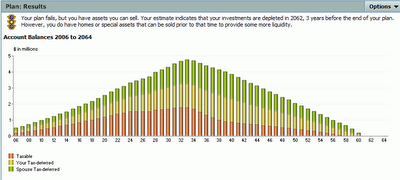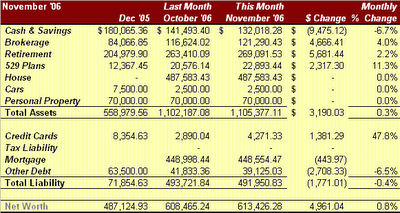Fellow bloggers - this is a very important matter - the 401k industry (members of it at least) is busy raping the savings of future generations with outlandish dishonest fees. Please help create a meme and linking back to this topic - if we do not raise the public consciousness, it will not be fixed!
I've been having two very frustrating experiences - the first deals happens every month and it involves my wife's 401k. The second is current and not yet resolved and it deals with my 401k at Big Company.
In short, my wife's employer - a small busines, has been suckered into placing their 401k plan with a regional bank. It has high asset management expenses on top of what would be otherwise ok, but undesirable, expense ratios. It also has a poor selection of funds.
A regional bank administrates the 401k for my wife. They provide a mediocre assembly of mutual funds - nothing very special - all actively managed with expense ratios between 0.8 - 1.x%. Average for the active managed fund, but high compared to the index funds which usually beat them. I've put her money into a life cycle fund 90% (3 stars - no better option exists) and added foreign developing markets 5% and international 5% to increase the international weighting. I suppose I'll eventually need to rebalance it for her.
The problem with her 401k plan - despite the poor selection of funds, is that the regional bank charges a 0.5% asset management fee. This is ridiculous -- none of our other 401k plans have ever charged such a fee. It effectively destroys the return of more stable value products such as short term bond funds. Over the long term, it seriously eats away the employee's investment. So the undesireable, but not unreasonable expense ratios I quoted earlier move sky high into the rip-off zone. Would you pay 1% for an index fund when you can get it between 0.08% and 0.35% at Fidelity or Vanguard?
A study I read from Portfolio Solutions predicts that bonds will earn 3.5% over the long term. Would you be willing to give up 15% of your return for the next 20 years just to have the account at your bank?
On the other hand, Big Company, who you think would be much more astute has a 401k plan, run by a major international brokerage, that is so opaque, I can't even calculate the actual expense ratios. I've worked with many big financial companies. Quite a few have offerings from Vanguard or Fidelity, or even both. Big Company - no way.
Our national brokerage has a piss-poor website without on-line access to many of the prospecti. Over the telephone, there brokers do not have access to the prospecti and cannot answer even basic questions, such as expense ratios.
Why is the national brokerage going to such an effort to make the expense ratios unclear? My fear is that they are unreasonably high.
Big brokerage provides a smattering of funds that read like the best of Money Magazine from three years ago. There's a lifecycle fund that isn't bad, but when you look at it's investment composition it's heavily laden toward large cap growth - although it's a hot trend at times - a study of historical returns will tell you that large cap growth is a poor long term asset class - usually loaded with the prior cycle's winers - value selections, especially small cap, have the best long term (30 years plus) rewards. There are three index options - mostly domestic big, med and small. Of course there's no way to find out what expense ratios are - but I bet - they are sky high.
I'm new at big company, so it would not make sense to create a campaign to change things right away. However, yesterday's Wall St. Journal had articles about the pressure for 401k reform. So many employer sponsored 401ks are laden with high and often hidden expense ratios, 12b1 marketing fees and administrative fees or asset management fees. But employers seldom select 401k administrators on that basis - personal relationships and managerial reporting tend to trump employee retirement requirements.
Here are some changes that would fix this situation:
- Let employees roll their contributions and balances our of an employer sponsored plan into a private plan at a brokerage of investment house they choose.
- Require all 401k administrators to clearly document all expenses employees will bear on their investments.
- Required all 401k plans to have low cost index fund options.
- For those poorly read in finance, let the employers provide low cost lifecycle funds (to their kudos, many plans are now providing these).
- Prohibit asset management fees charged as a percentage of assets under management - fees should be flat and specific
If your employer were consciously or through negligence imperilling your retirement - how would this effect your loyalties? Would you plan to spend the next 20 years of your career there?
The article at the Wall Street Journal raises some very interesting points:
- employers are required to manage the 401k plan in the best interest of the participatns - hah!
- many common arrangements in the 401k industry are illegal - such as mutual fund companies using investor fees to pay consultants - the same ones that recommend which funds to include inplans
- another ridiculous practice is to provide investor class mutual funds - the funds with the highest expense ratios - when lower cost institutional class funds are available
- a number of class action suits are brewing against 401k administrators (mainly by personal injury shops) - Fidelity lost a case in Wisconsin where it was accused of having unreasonable and excessive fees as well as hidden arrangements that misused investor's money - they plan to appeal - if they win - will you?
- Will employers who abbrogate their fiduciary responsibility be the next target for lawsuits?
Regards,
makingourway
PS This is a very important issue that effects most working adults, their families and their spouses - please discuss, blog and talk about this issue. If you read this blog you are interested in personal finance and very likely to be more informed than the general public. As a member of the pfblog community it is likely that your friends and peers will look up to your growing knowledge of personal finance. Please make them aware of this issue. Ultimately, if this problem is not addressed very many people risk being unprepared for retirement (how can you be prepared when you're paying 2+% annual expenses in direct and hidden fees). It is naive to think that a public solution (massive welfare entitlements) won't be considered a serious option - this will be a massive cost that we will all have to share (and our children). Better to be prepared by saving wisely now and not mortgaging future generations retirement.




